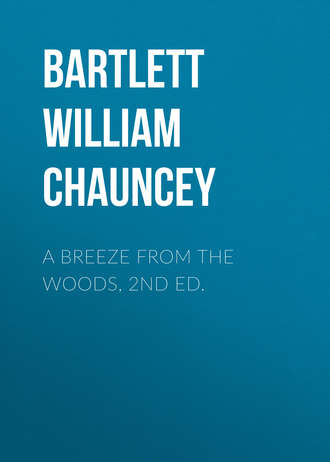 полная версия
полная версияA Breeze from the Woods, 2nd Ed.
We have brought forth nothing out of our poverty, but rather out of an affluence which could not be wholly restrained. As a gardener clips his choicest shrubs, casting the tangled riotousness of bud and blossom over the wall, so there are many here who have only trimmed a little what they have planted in their own gardens of poetry and fiction.
The little that has been done here in art is rather a sign of better things to come. Art must not only have inspiration, but it needs wealth and the society of a ripe community for its best estate. It is possible to paint for immortality in a garret. But a great deal of work done there has gone to the lumber-room. Not only must there be the fostering spirit of wealth and letters, but art also needs a picturesque world without – the grand estate of mountains and valleys, atmospheres, tones, lights, shadows – and if there be a picturesque people, we might look for a new school of art, and even famous painters. Where a poet can be inspired, there look also for the poetry which is put on canvas.
In one respect our modern civilization is nearly fatal to art. Philip Hamerton says that "a noble artist will gladly paint a peasant driving a yoke of oxen; but not a commercial traveler in his gig… Men and women have a fatal liberty which mountains have not. They have the liberty of spoiling themselves, of making themselves ugly, and mean, and ridiculous. A mountain cannot dress in bad taste, neither is it capable of degrading itself by vice. Noble human life in a great and earnest age is better artistic material than wild nature; but human life is an age like ours is not."
If a great artist were asked to paint a fashionable woman in the prevailing stringent costume, do not blame him if he faints away. There will never get into a really great painting any of the stiff and constrained costumes of our time. Observe that the sculptor rarely cuts the statute of a modern statesman without the accessories of some flowing and graceful attire. He cannot sculpture a modern dress-suit without feeling that he has offered an affront to art.
But in spite of our civilization there is a great deal that is picturesque among the people – the Parsee, Mohammedan, Malay, and Mongol, whom one may sometimes meet on the same street – the red shirt of the Italian fisherman, and the lateen sail which sends his boat flying over the water. The very distresses and distraits of men here have made them picturesque. I have seen a valedictorian of a leading college deep down in a gravel mine, directing his hydraulic pipe against the bank. Clad in a gray shirt and slouch-hat, he was a far better subject for a painter than on the day he took his degree. The native Californian on horseback, with poncho, sombrero, and leggings, is a good subject for the canvas, as well as the quaint old church where he worships, so rich in its very ruins. Moreover, the whole physical aspect of the country is wonderfully picturesque. The palm tree lifting up its fronded head in the desert, the great fir tree set against the ineffable azure of the heavens, the vine-clad hills, the serrated mountains which the frosts have canonized with their sealed and unsealed fountains, and all the gold and purple which touch the hills at even-tide – these are the rich ministries of nature. It may take art a thousand years to ripen even here. For how many years had the long procession of painters come and gone before Raphael and Michael Angelo appeared?
Our young art school will some day have its treasures; and there will be hung on these walls the portraits of other men whose culture and influence will be worth more than all the gold of the mountains. Let the artist set up his easel and write his silent poem upon the canvas. Welcome all influences which soften this hard and barren materialism. Before the mountains were unvexed by the miner's drill the land itself was a poem and a picture. One day the turbid streams will turn to crystal again, and the only miner will be the living glacier sitting on its white throne of judgment and grinding the very mountains to powder. Fortunate they who can catch this wealth of inspiration. These are the ministers and prophets whose larger and finer interpretation of nature are part of the treasures of the new commonwealth.
1
As the title of this paper was adopted more than eleven years ago, it has not been deemed expedient to change it because Mr. John Burroughs has recently chosen it as the title of his book.
2
Delivered on "Assembly Day," at the University of California.

